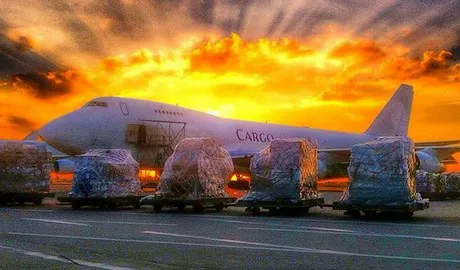An increasing number of customers seeking the freshest produce has caused a surge in air freight exports from the United States. This was demonstrated by United Airlines recently announcing a 54% increase in the amount of cherries they carried in 2017 compared to the previous year. The bulk of the cherries went across the Pacific to markets in East Asia and Australia.
"United Cargo transported approximately 3,200 tons of cherries this season," said Adam Cooper, of United Airlines Cargo - US West. "The volume of cherries we carried in the 2017 season was up 53.8% over 2016. During the 2017 cherry season, the bulk of the California cherry crop was transported to Japan, the Greater China region (mainland China, Taiwan and Hong Kong), Korea and Australia. The primary destinations of Washington cherry shipments included the Greater China region, Japan, Korea, Australia and Singapore."
Factors contributing to growth
One of the main reasons for the surge in the air freight of produce has to do with the amount of demand for ever-fresher produce, particularly in the rising middle class markets of Asia. According to Cooper, there were also other reasons for this year's large numbers, including an extra large cherry crop as well as growth in United Airlines' market share.
"Pharmaceuticals have been the “rising commodity” in air cargo in recent years, but fresh produce is giving pharma some competition in the area of growth," Cooper said. "There were three contributing factors to the large increase in the cherry freight figures: United Cargo gained market share, there was an abundant crop of fruit this year, and demand is growing in the primary cherry markets in Asia. Overall, our transport of fruits and vegetables has increased more than 20% this year compared to the same period in 2016."
"One significant reason is the increase in the number of people in the middle class in the Asia Pacific, and their rising purchasing power," Cooper added. "There is a greater appetite for high-end perishables, and consumers are demanding that this produce is as fresh as possible. They are willing and able to pay for this quality – which leads to more of these products being transported via air."
Moving fresh produce to maintain optimal freshness
To move sensitive fruit from the tree to a market half way across the globe requires careful planning along with appropriate equipment. Carriers like United work closely with growers to coordinate the deliveries. "Cherries are washed and packed as soon as possible after picking, and the boxes of cherries are stacked onto skids for transport," Cooper said. "We receive these skids from our forwarder customers – each skid usually weighs between 700 and 800 kilos. We then build skids up on ULD pallets for transportation on our aircraft. Cherries are delicate and highly perishable, so they are typically held at the forwarder’s refrigerated facility and then dropped at the our air cargo facility in a refrigerated truck within four to six hours of flight departure. If necessary, we store the shipments in the cooler at our freight facility."
Cooper also pointed out that United Airlines are observing an increase in a number of fresh produce items transported by air. The airline is expecting this trend to continue and are positioning themselves to be available to absorb that increase with their operations. "We are carrying a greater amount of a number of different types of produce," he said. "The most noticeable increases are in lettuce, broccoli, asparagus, berries, grapes, stone fruit (peaches in particular) and fresh herbs."
"As United continues to deliver the quality service our customers require, and as we modernize our aircraft fleet, we anticipate continued growth in perishable/fresh produce shipping," Cooper continued. "All fresh produce shipments transported by United Cargo are carried on United’s passenger flights. The newest additions to our widebody fleet – the Boeing 777-300 and 787-900 – are both well-designed for quickly transporting fresh produce to other parts of the world. As long as the global economy continues to develop (generating increasing demand) and the weather cooperates (providing the necessary supply), we are extremely positive about the future of this market."
For more information:
Adam Cooper
United Air Cargo, US West
Tel: (+1) 800-822-2746




